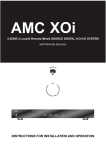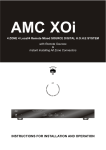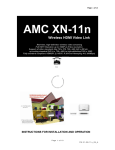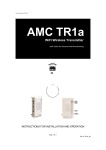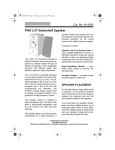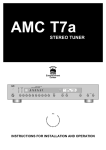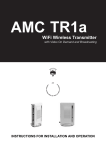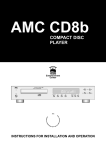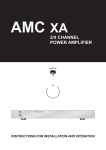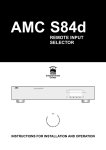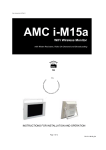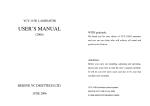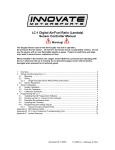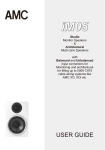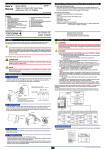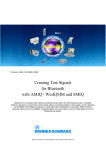Download XO_Manual (21R-4209) v04.cdr
Transcript
AMC XO 8 ZONE 8 SOURCE DIGITAL H.O.M.E. SYSTEM with Remote Sources & Instant Installing All Zone Connectors IA Digital Home system XO H.O.M.E. AUTOMATION SERIES 1 2 3 4 5 6 7 8 POWER APPLICATION AND FEATURE LIST Features of the AMCTM model XO * System for total 8 Zones * System with 8 Sources 4 Global Sources & 4 Remote Local Sources * Only RJ45 & Speaker Wires used for installations from XO main unit to all zones * Two ways AMC propriotary Digital Data Communication System between XO main unit and keypads in all zones * Designed with cascade feature for keypad XK1 * Two All Zone Connectors for making installing XO like 123 in seconds * Volume Control & Tone Control for each Zone * Four 38KHz and four 56KHz IR outputs on rear panel of XO main unit * Doorbell and telephone mute system (PDM1) - option * With RS232 to digital link with other systems - option * IR remote control receiver on each zone for controlling XO main unit and remote Sources in other zones * RCA, 3.5mm mini jack and RJ45 Remote Source input jacks in each Zone * Low profile 1U * Power of each channel / zone : 15W x 2 Digital Amplifiers for Zone 1~4, for zone 5~8 the power is depending on the power of power speakers or power amplifiers connected to XU1 * The XO package contents: 1 XO Eight-Source (4 local & 4 Remote), Eight-Zone Digital Home System main unit 1 ZT8 8 Zone Terminal 2 SCSI 50 wires cable 4 IRE1 IR emitters with feedback LED 1 Remote Control Handset 1 This manual 1 Zone description labels * Options : XK1, XS1, XU1, PDM1 (numbers of XK1, XS1, XU1, PDM1 required based on each installation designs) 2 REAR PANEL CONNECTIONS/FRONT PANEL CONTROLS LINK L 1 L 3 1 Digital Home System 3 STATUS R R 1 2 3 2 4 SOURCE 1 4 2 IR OUT -38KHz IR OUT -56KHz 2 3 +12VDC 4 RS232 PRE-OUT VC/NVC ZONE 6 ZONE 7 ZONE 5 AC115V/ 60Hz 120W ZONE 8 VC VC VC VC NVC NVC NVC NVC 1 ALL ZONE CONNECTOR 2 MUTE Front FUSE: T2AL 250V 4 5 6 8 7 12 9 11 10 Rear ZT8 Doorbells 1 & 2 Tel Lines 1 & 2 AMC PDM1 (Phone-Doorbell-Mute Module) 7. 12VDC 8. PRE-OUT VC/NVC (Zone 5~8) 9. All Zone Connector-1 10. All Zone Connector-2 11. AC input receptacle with Fuse 12. RS232 FRONT PANEL Digital Home system XO H.O.M.E. AUTOMATION SERIES 1 2 3 4 5 6 7 8 POWER 1 2 1. Power Switch (Standby / Off) & Blue LED 2. Zone LED & 8 square Recesses 3 Zone 1 Zone 2 Zone 3 Zone 4 Zone 5 1. Local Source Inputs 1~4 2. IR Out - 38KHz 3. IR Out - 56KHz 4. Mute 5. Link 6. Status Zone 6 Zone 7 Zone 8 8 Zones REAR PANEL CONNECTIONS 1. Local Source Inputs 1~4 Each of these stereo RCA inputs receives an audio signal from up to four independent audio sources. Remarks: There are other 4 Remote sources from Zone 1~4 as Remote Source Inputs R5 to R8 can be selected by all zones. provides a +12VDC output when a zone is turned on. This can be used to trigger external equipments. 7. 12VDC for supplying 12VDC to external modules. (total 1A max) 8. PRE-OUT VC/NVC (Zone 5~8) These 4 switched are for setting Zone 5~8 PRE-OUTS to be with VC (Volume Control) or NVC (No Volume Control) 2. IR Out - 38KHz for most Audio Sources 3. IR Out - 56KHz for cable and satellite boxes 9. All Zone Connector-1 This is SCSI Connector for SpeakerZone 1~4 and PRE-OUTS-Zone 5~8 (Balanced) 4. Mute This 3.5mm non-shorting Stereo connector (Power, Mute, Gnd) is designed to be used in conjunction with the AMC PDM1 (PhoneDoorbell-Mute Module) - This is an option feature. 10. All Zone Connector-2 This is SCSI Connector for IR in/out Data, Status, R5 to R8 Remote Sources Signals(From Z1~Z4), +12V and Ground. 5. Link This 3.5mm mono connection is used to expand the AMC XO from eight to sixteen zones. - This is an option feature. 11. AC input receptacle with Fuse 12. RS232 This is used for making interface with other system and for factory purposes. - This is an option feature. 6. Status This 3.5mm mono connection 4 FRONT PANEL CONTROLS 1. Power Switch (Standby / Off) & Blue LED The Power Switch turns AMC XO "Standby" or "Off" The Blue LED will be lit up during "Standby", will be turned off during "Off" 2. Zone LED & 8 square Recesses Each of these LEDs indicates, when lit, that its zone keypads are turned on. The 8 square recesses are for putting labels of names of all zones KEYPAD 6 1 5 2 4 3 5 10 7 9 8 1. LED's of Volume Level of the zone volume-only one LED will be light up. 2. Volume up 8. JK2 (RJ45) (TO ZT8) Use CAT5 cable to connect from the JK2 of XK1 to ZT8 (or JK3 of Another XK1. - option) / down 3. IR Receiver Each keypad has an IR receiver for controlling the source equipments. 9. JK3 (RJ45) (Another XK1) Use CAT5 cable to connect from the JK3 of XK1 to JK2 of Another XK1. This is an option features. 4. Power The power button turns the keypad's zone on and off independently of the other zones. 10. JK4 (RJ45) (This is Pre-Out) (To Main-in) Use CAT5 cable to connect from the JK4 of XK1 to main-in of amplifiers or power speakers. - This is an option features. 5. Mute The mute button temporarily mutes any audio playing in that keypad's zone. 6. Source Selection The 8 source buttons independently select any of the four local sources ( Source 1 to 4) connected to the rear panel of AMC XO main unit and four Remote Sources (Source R5 to R8) connected to the XS1 of Zone 1 to 4. (R5 located at Zone 1, R6 located at Zone 2, R7 located at Zone 3 and R8 located at Zone 4) The selected source button will remain lit. 7. JK1 (RJ45) (TO XS1) (Zone 1~4) OR XU1 (Zone 5~8) OR POWER AMP (ZONE 5~8) For ZONE 1~4, please use CAT5 cable to connect from the JK1 of XK1 to the RJ45 connector on the rear side of XS1 for hooking to Remote Sources R5 (located at ZONE 1), R6 (located at ZONE 2), R7 (located at ZONE 3) and R8 (located at ZONE 4). For ZONE 5~8, please use CAT5 cable to connect from the JK1 of XK1 to the RJ45 connector on the rear side of XU1 for hooking to Power Speakers like AMC iM05 or Power Amp with passive speakers. 6 8 ZONE TERMINAL ZT8 SCSI Connector 1 SCSI Connector 2 Zone 3 SPK Zone 4 SPK JK1 (RJ45) Zone 5 JK14 (RJ45) Zone 4 JK2 (RJ45) Zone 6 JK13 (RJ45) Zone 3 JK3 (RJ45) Zone 7 JK12 (RJ45) Zone 2 JK4 (RJ45) Zone 8 JK11 (RJ45) Zone 1 Zone 2 SPK Zone 1 SPK 7 REMOTE SOURCE XS1 (for Zone 1 to 4) RCA Jack Inputs (L & R) 3.5mm Mini Jack Inputs (L & R) IR Output (3.5mm Mini Jack) RJ45 (L & R Inputs and IR Output) RJ45 to JK1 of XK1 via CAT5 Cable BALANCED TO UNBALANCED MODULE XU1 RCA Jack outputs (L & R) 3.5mm Mini Jack Outputs (L & R) IR Output (3.5mm Mini Jack) RJ45 (L & R Outputs and IR Output) RJ45 to JK1 of XK1 via CAT5 Cable 8 (for Zone 5 to 8) REMOTE CONTROL 1 2 3 4 1. Power On & Off This button turns the zone on and off and powers all the zones off when it is pressed and held. "Mute On" and "Mute off" turn the mute "On" or "Off" 4. Volume Perform the same function as the volume button on the zone keypads. The volume level indicator on the keypad will respond correspondingly to the volume command from the remote control. 2. Source Selection These 8 buttons correspond to the four local source buttons ( source 1~4) and four remote source buttons (source R5 ~R6) on the zone keypad. 3. Mute & Mute On & Mute Off "Mute" button mutes the zone in the same way as the keypad mute button. 5. The remote control is basically with the same functions of keys as AMC S84 9 INSTALLING THE XO DIGITAL HOME SYSTEM 1. Prewire The XO uses Cat-5 cable for keypad control and either two- or four-conductor 16gauge speaker wire. All the wire is homerun from each zone to the location of ZT8 that normally located behind XO and hooked to XO via short SCSI cable. 2. The XO digital home systems require Cat5, unshielded, twisted pair (UTP), for communication between the keypads/display pads and the main XO unit. Each end of the wire is terminated with an RJ45 connector. The XO system can accommodate 500 total feet of Cat5 cable for each zone. For the most reliable operation,it is best that no single run of Cat5 exceeds 250 feet. The correct wiring scheme for the Cat5 cable is standard EIA/TIA 568A. Properly terminating the Cat5 cable is crucial for the operation of the system. It is very important to use a good quality crimp tool, and testing each end to end run with Cat5 wire tester will insure that your system operate flawlessly, Fig. 1. Fig.1: EIA 568A wiring scheme for Cat 5 Cable Pin # 1. Green Stripe 2. Green 3. Orange Stripe 4. Blue 5. Blue Stripe 6. Orange 7. Brown Stripe 8. Brown Note: Colors listed as "stripe" are a white wire with a colored stripe. 10 Step-by-Step Crimping instructions Step1 Strip a 2 to 3 inch portion of the insulation, exposing the 4 twisted pairs. Step2 Untwist the wires and fan them out individually. Arrange the wires into the correct color scheme as shown in Fig.1 Step3 Flatten the wires in their correct order, and trim them evenly across the top. Most crimp tools have a wire trimmer built-in. It is best to trim the wires to about 1/2 in length. Step4 While holding the wires flat between your thumb and forefinger, insert the wires into the RJ45 connector, so each is its own slot. Push the wire into the RJ45, so all 8 conductors touch the end of the connector. The insulation jacket should extend beyond the crimp point of the RJ45. Step5 Insert the RJ45 into the crimp tool receptacle and squeeze the tool firmly. Note that a ratchet type tool should tighten down until it no longer clicks. Step6 The RJ45 should be firmly crimped to the Cat5 insulation. It is necessary that the color scheme be repeated identically on each end of the wire. 3. Speaker Wire Termination at ZT8 (8 Zone Terminal) It is important to keep the proper orientation of positive and negative signal for each speaker connection. Typically, two-conductor speaker wire uses red to denote positive and black to denote negative. Some types of wire indicate positive with dark line running through the insulation. Four-conductor wire can also be used. This has four separated wires in one outer jacket, making it possible to run a single speaker wire to a zone for its pair of speakers. This type of wire typically uses red and black for one speaker and white as positive and green as negative for the second speaker. 11 4. ZT8 Both the speaker wire and Cat5 cables for each zone terminate into the back side of the ZT8. The order of Cat5 plug-ins is irrelevant to the operation of the system,but it is recommended that you label the individual Cat5 cables for future references. Follow the zone and polarity labeling for speaker wire termination, Fig. 2 Fig. 2 The final connections from ZT8 is made with the SCSI cables supplied with XO Digital Home System, fig. 3 RS232 1 ALL ZONE CONNECTOR Fig. 3 12 5. Installing the XO The XO is designed to be placed on a shelf or in a component rack. If you are mounting the XO with other components,you should remove the feet. The audio sources are plugged into the four local source inputs on the back panel of the XO using stereo RCA cables, Fig.4 L L 1 R R 2 1 2 3 Source 1 Tuner 1 Audio Out 4 SOURCE 6. IR Outputs The XO system ships with four IRE1 IR Emitters for transferring IR data from the keypad receivers (located under the volume button) to the IR receiver on each piece of source equipment. There are two separated IR output sections on the back panel. The 38KHz outputs are used for most audio sources. The exception to this is cable and satellite boxes, which operate at a higher IR carrier frequency closer to 56KHz.It is important that the output being used for each source matches the source input number. The outputs work individually with each source to allow independent source control. Simply plug the IRE1 IR emitter into the appropriate IR output on the back of the XO and attach the flasher end over the IR receiver of the source equipment, fig. 5 LINK L L R R 1 2 3 SOURCE 4 1 3 2 4 IR OUT -38KHz 1 3 2 4 IR OUT -56KHz MUTE Fig. 5 13 7. Keypad XK1 and Zone Setup The Zone number each keypad XK1 belonging to is decided by which RJ45 connector each keypad connected through CAT5 cable from JK2 of XK1 to ZT8. EQ Control and Source Grouping The keypads can be used to set specific zone functions. These are for bass and treble EQ response and source grouping. To change bass response, press the Mute button and Source 2 button simultaneously. Adjust the bass level up or down by using the Volume Up and Volume Down buttons. The Volume indicator LEDs will indicate the output level, Fig. 7. Adjust treble response using the same process. This is accessed by pressing the Mute and Source 3 buttons. Once the desired setting is made, press the Source button again to return the keypad to normal operation. -8dB -6dB -4dB Flat +4dB +6dB +8dB Fig. 7 Mute Volume Power Source grouping is a feature that allows multiple zones in an open living space to always share the same source selection but still retain individual volume and on/off control. To get into group mode - press and hold any Source (1-8) button until all of the volume LEDs light. All of the other zones should change to the same source. Changing sources in any zone will change all zone sources. When in group mode - selecting MUTE should mute all zones. Press MUTE again will take all zones out of mute. When in group mode - Power OFF will turn all zones off and take the XO out of group mode. To leave group mode - press and hold any Source (1-8) button again utill all of the volume LEDs light. The XO system keypads automatically memorize the listening volume to when all zones have been turned off and a zone is turned on again. 14 8. Using the Link Jack to create Sixteen Zones (This is an optional feature) Two XO can be made to react as one using the back-panel 3.5mm connection labeled "Link". This requires the use of "Y" cables to link the source inputs and IR outputs. A single mono mini-patch cable is then plugged into the "Link" jack on both XO. This links the All Off command so when it is initiated at any of the zone keypads, all sixteen zones will turn off. 9. Mute Input and the AMC PDM1 (Phone-Doorbell-Mute Module) (This is an optional feature) The back panel of the XO has a 3.5mm non-shorting stereo connector input labeled "Mute". This is designed to be used with the AMC PDM1 Phone-Doorbell-Mute module. When the PDM1 is connected, the system will temporarily mute when the phone or doorbell rings. 1 2 3 Front Rear AMC PDM1 (Phone-Doorbell-Mute Module) 1,2 Doorbell (This is an optional feature) The back of PDM1 will accept up to two AC or DC voltages from two different doorbell chimes. This connection is done with two conductor wire from the terminals on the doorbell chime to the Doorbell A or Doorbell B inputs on the back of the PDM1, Polarity is not important for this connection. 3. RJ-11 Connection Up to two phone lines can be brought into the RJ-11 connection on the back. The voltage from the phone ringer will trigger the XO System to mute. 15 SPECIFICATIONS To t a l Z o n e s . . . . . . . . . . . . . . . . . . . . . . . . . . . . . . . . . . . . . . . . . . . . . . . . . . . . . . . . . . . . . . . 8 Z o n e s Z o n e 1 ~ 4 w i t h S p e a k e r O u t p u t s . . . . . . . . . . . . . . . . . . . . . . . . . . . . . . . . . . . . . 1 5 Wr m s x 2 Zone 5~8 with Stereo Audio Signal Outputs Output Level ............................................... 1.1 Vrms Volume Control ........... with Pre-out VC/NVC switch for each Zone C o n t r o l s f o r e a c h Z o n e . . . . . . . . . . . . . . . . . . . . . . . . Vo l u m e a n d To n e C o n t r o l s Sources .......................... 4 Global Sources & 4 Remote Sources Sensitivity ....................................................... 60mV IR outputs frequencies .................... four 38KHz and four 56KHz IR output level ....................................................... 5V p-p Phone input sensitivity ................................. AC25V~AC100V 20Hz Doorbell input sensitivity ....................................... AC/DC 3~12V PHYSICAL Dimensions (W x H x D).................W 430.0mm x H 53.3mm x D 338.5mm Net weight................................................................6.0Kgs Shipping weight (4 pieces).......................................... 38.0Kgs Power consumption.................................................. 100W Weltronics Corp. reserved the right to improve its products at any time. Specifications are subject to change without notice. 16 SAFETY INSTRUCTION 1. READ INSTRUCTIONS 16. DAMAGE REQUIRING SERVICE All the safety and operating instructions should be read before the appliance is operated. 2. RETAIN INSTRUCTIONS The safety and operating instructions should be retained for future reference. 3. HEED WARNINGS All warnings on the appliance and in the operating instructions should be adhered to. 4. FOLLOW INSTRUCTIONS All operating and use instructions should be followed. The appliance should not be used near water - for example, near a bathtub, washbowl, kitchen sink, laundry tub, in a wet basement, or near a swimming pool, etc. 6. CARTS AND STANDS The appliance should be used only with a cart or stand that is recommended by the manufacturer. 7. WALL OR CEILING MOUNTING 17. POWER LINES (APPLIES TO TUNER AND RECEIVERS ONLY) An outdoor antenna should be located away from power lines. 5. WATER AND MOISTURE 6A. An appliance and cart combination should be moved with care. Quick stops, excessive force, and uneven surfaces may cause the appliance and cart combination to overturn. The appliance should be serviced by qualified service personnel when: a) The power-supply cord or the plug has been damaged; or b) Objects have fallen, or liquid has been spilled into the appliance; or c) The appliance has been exposed to rain; or d) The appliance does not appear to operate normally or exhibits a marked change in performance; or e) The appliance has been dropped, or the enclosure is damaged. PORTABLE CART WARNING S3125A This equipment is not designed for use mounted on a wall or a ceiling. 8. VENTILATION The appliance should be situated so that its location or position does not interfere with its proper ventilation. For example, the appliance should not be situated on a bed, sofa, rug, or similar surface that may block the ventilation openings, or placed in a built-in installation, such as bookcase or cabinet that may impede the flow of air through the ventilation openings. 9. HEAT The appliance should be situated away from heat sources such as radiators, heat registers, stoves, or other appliances (including amplifiers) that produce heat. 18. OUTDOOR ANTENNA GROUNDING (APPLIES TO TUNER AND RECEIVERS ONLY) If an outside antenna is connected to the receiver, be sure the antenna system is grounded so as to provide some protection against voltage surges and built up static charges. Section 810 of the National Electrical Code, ANSI/NFPA No. 70-1984, provides information with respect to proper grounding of the mast and supporting structure, grounding of the lead-in wire to an antenna discharge unit, size of grounding conductors, location of antenna-discharge unit, connection to grounding electrodes, and requirements for the grounding electrode. See Figure. a) Use No. 10 AWG (5.3 mm2) copper, No. 8 AWG (8.4 mm2) aluminum, No. 17 AWG (1.0 mm2) copper-clad steel or bronze wire, or larger, as a ground wire. b) Secure antenna lead-in and ground wires to house with stand-off insulators spaced from 4-6 feet (1.22-1.83 m) apart. c) Mount antenna discharge unit as close as possible to where lead-in enters house. d) Use jumper wire not smaller than No.6 AWG (13.3 mm2) copper, or the equivalent, when a separate antennagrounding electrode is used. See NEC Section 810-21(j). Antenna Grounding According to the National Electrical Code 10. POWER SOURCES The appliance should be connected to a power supply only of the type described in the operating instructions or as marked on the appliance. Antenna Lead In Wire 11. POWER-CORD PROTECTION Power-supply cords should be routed so that they are not likely to be walked on or pinched by items placed upon or against them, paying particular attention to cords at plugs, convenience receptacles, and the point where they exit from the appliance 12. CLEANING The appliance should be cleaned only as recommended by the manufacturer. Ground Clamp Electric Service Equipment The power cord of the appliance should be unplugged from the outlet when left unused for a long period of time. Power Service Grounding Electrode System (NEC Art 250 Part H) 14. OBJECT AND LIQUID ENTRY 15. SERVICING The user should not attempt to service the appliance beyond that described in the operating instructions. All other servicing should be referred to qualified service personnel. Grounding Conductors (NEC Section 810.21) Ground Clamps 13. NON USE PERIODS Care should be taken so that objects do not fall and liquids are not spilled into the enclosure through openings. Antenna Discharge Unit (NEC Section 810.20) National Electrical Code Available from Library, book stores, or National Fire Protection Association (Batterymarch Park, Quincy. MA 02269). AMC 21-3004 WELTRONICS CORP. LONDON/L.A. AMC Web: http://www.amchome.com PN: 21R-4209




















